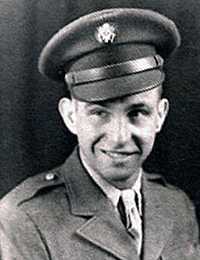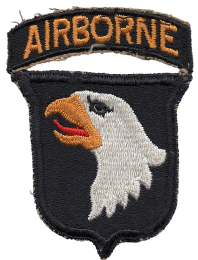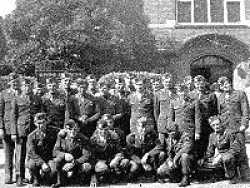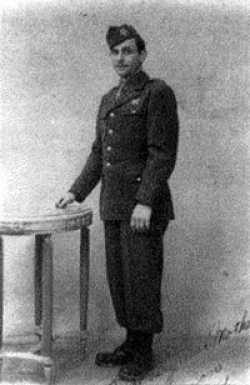To understand why I became a medic you'll have to hear a little about me before I entered the service. My family consisted of my Dad, my Mother, my Brother ( seven years older than me ). My Dad was a engineer on the New York Central Railroad for 33 years and was killed in a railroad accident on the 23rd of December 1941. My Mother was a registered nurse when she married my Dad. So I have been around medical people all my life. We had very few medical bills as Mother took very good care of all of us. When my Dad died my Brother felt like he was in charge and he pretty much run things. Then he was ordained as a minister and that really did it. I had two 6 months deferments until my Mother went to work in OB in the hospital across the street.
I had no qualms about being drafted, was glad to be away from home. My Brother and Mother insisted I try to get in the medics which I did after my Brother filled out all the forms for the government. I was offered a chance to go to the Air Corp at my induction center. I could have been a pilot, navigator or bombardier but I said NO I was going to keep my feet on the ground.
After several weeks of Medic training at Camp Barkeley Texas. We got good training in Barkeley and special training in Sanitation and Preventative Medicine. We took a lot of ribbing here in the states (pill pusher etc.) but not after I joined the 327th. I went overseas on the Queen Mary in March of 44. I was assigned to a repo-depo for two months and next thing I know in May, I'm assigned to a glider outfit in the 101st, but the division was already in the marshalling areas ready to go into D-Day so they held us back as reserves in Hungaford, England.
When the regiment came back to Reading in July we were assigned to the first battalion 327th Glider Infantry. I kind of trained on the job as we got ready for Holland. My job was to fill out the tag we tied to the jackets with what the injuries were, what we did for him, what medication we gave and of course the information off his dog tags. I had to send back to regiment a twenty-four hour report of all casualties.
The most interesting ride was to Holland. We loaded at Aldermaston outside of Reading, England. There was thirteen of us and one of our surgeons rode as co-pilot and slept all the way. Now there only space for twelve on the benches facing each other. So they gave me a snap down seat by the door (there was no door on this glider) facing forward in the glider. I had a great view of England, the Channel, the fog after crossing and a good view of flak bursts and a good view of all the wrecked gliders on the field where we were supposed to put that glider down into. This is when I knew I was in a real WAR!!!
The aid men stayed with us in camp but stayed with their respective companies in the battalion during battle. The litter bearers worked out of the station during battle. We had two surgeons in the aid station, Capt. Harry Holzer was the CO, and Capt. Herbert Jacobs 2nd in command. The line outfits sure took care of us but we were closer to the MLR than most aid stations, after all there was no rear area as we landed behind German lines. We took care of anybody the got to our station including Germans. We even took care of a couple British officers in Holland. I was the clerk in the station and also helped patch up guys that were hurt.
Don Frederick





